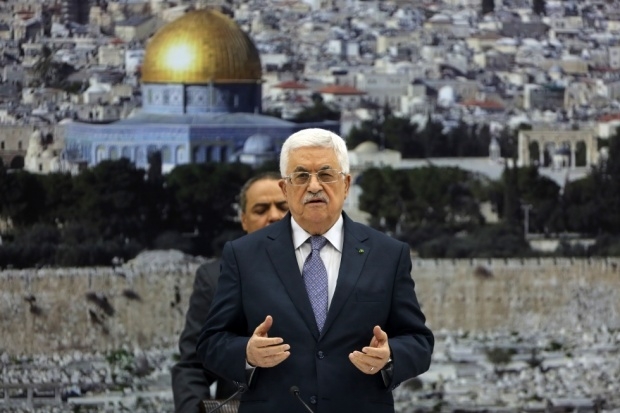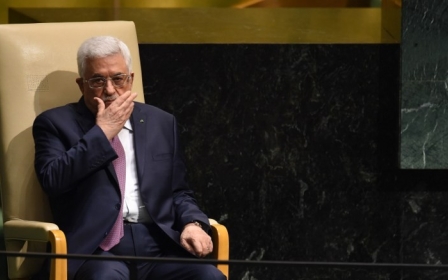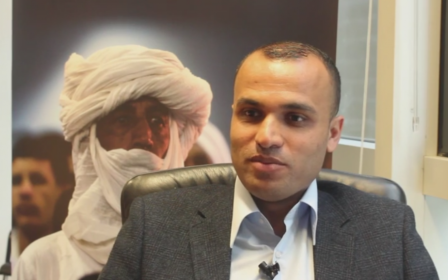Abbas challenges the Israeli left

There is no doubt that one word will be remembered from President Mahmud Abbas' speech in front of the United Nations General Assembly last Friday: "Genocide" ("war of annihilation" is the exact term in Arabic), was used three times, describing the last Israeli attack on Gaza. In Israel, and elsewhere in the world, it was conceived as a reference to that which nothing could be compared, meaning the Holocaust. Condemnation from all Israeli parties followed, as Abbas should have expected.
Yet, the most important phrase came somewhere in the middle of the speech. "It is impossible, and I repeat - it is impossible - to return to the cycle of negotiations," emphasised Abbas, one of the chief architects of the Oslo Agreement, and maybe the only one of them still active on the political scene. "There is no meaning or value in negotiations for which the agreed objective is not ending the Israeli occupation," he added.
It is no wonder that the right wing in Israel almost welcomed Abbas' speech. Politicians such as Defence Minister, Moshe Yaalon, Foreign Minister, Avigdor Lieberman, Economy Minister, Naftaly Bennet and many others have put much effort into convincing the Israeli public that Abbas is no partner for peace, and negotiations with him and his government are a waste of time.
Prime Minister Benjamin Netanyahu, formally committed to a negotiated settlement with the Palestinians, was happy to be relieved of the task. In his speech at the General Assembly Monday, he depicted Abbas as a Holocaust-denier, with whom negotiations are a lost case. "We were accustomed to think that an Israeli-Palestinian peace will lead to peace between Israel and the Arab world," said Netanyahu, "but these days it is more probable that it will be the other way around. Peace with Arab countries will lead to an Israeli-Palestinian peace."
Yet, this new approach by President Abbas finds the Israeli centre-left in a more difficult situation. For many years, the so-called “peace camp” in Israel pushed forward a formula according to which a settlement with the Palestinians could be achieved only through direct negotiations. The peace agreement with Egypt in 1979, signed under the auspices of US President Jimmy Carter, but drafted by the two sides directly, served as an example. The Israeli governments, whether under Labour or Likud, always preferred the bilateral approach.
But what could have worked between two independent countries with two independent armies like Israel and Egypt, was much more difficult to achieve between two uneven parties like Israel and the Palestinians: one having a state and an army, and the other stateless, one occupier and the other occupied. The shortcomings of this unbalanced relationship were evident right from the beginning of the talks leading to the Oslo Agreements in 1993, where the PLO agreed to recognise Israel and renounce the armed struggle without achieving an Israeli recognition in the Palestinians' right for an independent state or even an end to settlement activity.
From 1993 onwards, the scene would repeat itself time and again. An Israeli leader, "ready for compromise," would try and squeeze the Palestinian leadership into concessions in the name of peace through direct negotiations, with or without US participation. This phenomenon reached an almost grotesque form, when in 2008, Prime Minister, Ehud Olmert handed a map of future Palestine to President Abbas, demanding that he would sign on it on the spot, without even showing it to his aides. Abbas was forced to copy the map on a napkin in order to remember what was offered to him.
In the last years, especially since Netanyahu came back to power in 2009, freezing almost all talks with the Palestinians, the "pro-negotiations" parties in Israel dwindled significantly - in numbers, but also in conviction. Even those Israelis who support a two state solution - a slim majority according to most polls - fail to believe that the two parties are capable of achieving it by themselves. At times it seems that Tzipi Livni is the last Israeli politician who truly believes that direct negotiations with the Palestinians could produce a peace agreement. Yet, after her all-out support for the last war on Gaza, her positions seem less and less relevant.
But despite all its apparent flaws, the peace camp in Israel has not come forward with a formula other than direct negotiation as the best tool to achieve a settlement. Abbas' speech, and his declared intention to abandon the direct negotiations in favour of asking the international community to put an end to Israeli occupation, pulls the rug from under traditional Israeli centre-left positions regarding the Israeli-Palestinian conflict.
One way of dealing with this Palestinian shift is to opt for unilateral measures. "Abu Mazen doesn't want a settlement,” says Dan Meridor, an ex-minister, who lost his place in the Likud parliamentary list due to his dovish positions. "Therefore unilateral measures are needed; turning areas B [under Palestinian civil administration and Israeli military control] into areas A [full Palestinian control], handing more civilian powers to the Palestinians, stopping settlements. The settlements are killing us."
Yet these unilateral measures, supported by Meridor and others, are limited to civilian aspects. The grim results of the withdrawal from Gaza deter Israelis from seriously considering a military pull-out from the West Bank or even parts of it. The disengagement ideas, so popular only few years ago, are out of fashion. And without military pull-out, unilateral measures do not seem to have any real appeal.
A more popular response is the "regional solution." If a peace agreement with the Palestinians is impossible to achieve - goes this line of thinking - why not form an alliance with Saudi Arabia, Sisi's Egypt and Jordan? We have a common goal - fighting Hamas, Iran and IS (everything is put at the same basket) - and we could use this common ground to pressure the Palestinians into a settlement with Israel.
This approach works a little better within the so-called “peace camp.” Promoting the Arab peace initiative, adopted by the Arab summit already in 2002, became the goal of some "pro-peace" (this is not said ironically) organisations in Israel. But there is one major flaw in this line of reasoning: Israel must accept the Arab initiative, including full withdrawal to 1967 borders, a just solution to the refugee problem and so forth. Yet neither Netanyahu nor Lieberman show any signs that they are ready to move in that direction.
But Abbas may have aroused a new way of thinking in the centre-left. "In the short term, his words are a gift to the right,” says Yariv Oppenheimer, head of Peace Now, Israel's most known peace organisation. "We are saying that he is a partner for peace, and he is saying that he is not interested." Oppenheimer affirms that in his eyes Abbas is still a partner, because "our end game is the same, two state solution and an end to occupation," but the methods achieving this goal might need to be revisited.
"When Abu Mazen [President Abbas] played to 'good guy,' it got him nothing," says Oppenheimer, "maybe a release of few prisoners and that's it. Maybe it is better that he will be less nice [to Israel] and stronger within his own people. Maybe we, in the left, should be less apologetic and more ready for battle with the right. I feel that our camp is paralysed. Abu Mazen is kicking the bucket. We should kick the bucket too."
Will Abbas’ speech be a wake-up call for the weakened Israeli left? It’s too early to say. But it does seem that he has shaken off some old formulas held for many years. The situation has changed, and in the Israeli left, some are starting to realise it.
New MEE newsletter: Jerusalem Dispatch
Sign up to get the latest insights and analysis on Israel-Palestine, alongside Turkey Unpacked and other MEE newsletters
Middle East Eye delivers independent and unrivalled coverage and analysis of the Middle East, North Africa and beyond. To learn more about republishing this content and the associated fees, please fill out this form. More about MEE can be found here.





